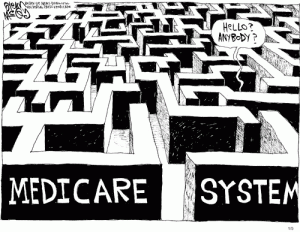“Do the right thing!” That’s how I often refer to the “person-centered” or “culture change” philosophy.
Recently I presented at the Pioneer Network with Steve Moran and used those words, “Do the right thing.” When I finished speaking and sunk into my chair at the front of the room Steve slipped me a note.
On it he had scribbled:
“Does that mean people aren’t doing the right thing?”
I’m quite certain I rolled my eyes at him, told him to pay attention and to stop passing notes while I silently cursed him in my head.
But his words got me thinking.
I use the phrase, “Do the right thing” because I hear people debate resident-centered versus resident-directed, and person-centered life versus person-centered care. Here’s my extremely expert take on the debate:
Who cares?
Not I!
Language is important, no doubt. But ultimately I’m less concerned with the terminology about doing the right thing than I am about…wait for it…actually doing it!
Call it whatever you want. Label it how you please. But for the love of God, just do the right thing for the right reasons!
One of my favorite examples is how people refer to those terry cloth pieces of fabric, full of pulls and stains, with the Velcro that never seems to stick together.
Clothing protectors? Wait what?
I get it. “Bib” is a childish term (though I never seem to think so when I don my lobster bib). But what do most homes still do? Slap a “clothing protector” on every person that comes in the door.
What’s the reason behind changing the name to clothing protector? The desired effect?
It is to recognize residents as adults, not children. As individuals, not infants.
But if we are still hooking nasty Velcro loops together on people without asking them, mostly because we are too busy to change their shirt should something get on it, have we really reached our desired effect?
Remember our desired effect was to recognize residents as adults. Adulthood means choice.
Does merely changing the word bib to clothing protector change anything other than the name? No, of course not!
If the goal is to treat people like the individuals that they are, and not like a child, aren’t our efforts better spent on something a little more impactful?
Language is important. It helps to reframe our mindset. A facility does not convey home, but it’s our intention behind our language is what REALLY matters most.
Are you putting lipstick on a pig in your own organization?
Here’s a simple way to check.
Before you change language, a policy or a process, take a moment to reflect on why you are making that change.
Ask yourself:
“What’s the desired effect we are after?”
Then go deeper:
“Does making this change get us there or do we need to go further?”
Only you know the answer. But remember, in the words of Richard Feynman, “The first principle is that you must not fool yourself and you are the easiest person to fool.”
Denise
If you like this article (or even if you don’t) it would be a great honor to have you subscribe to our mailing list HERE










